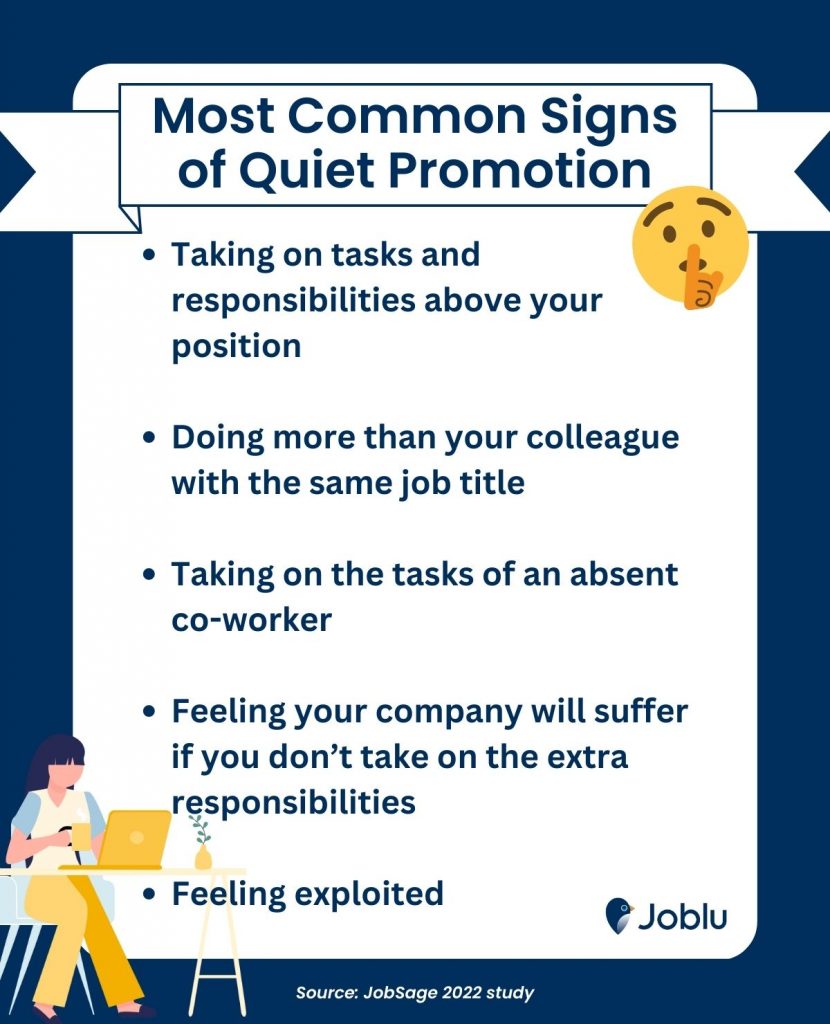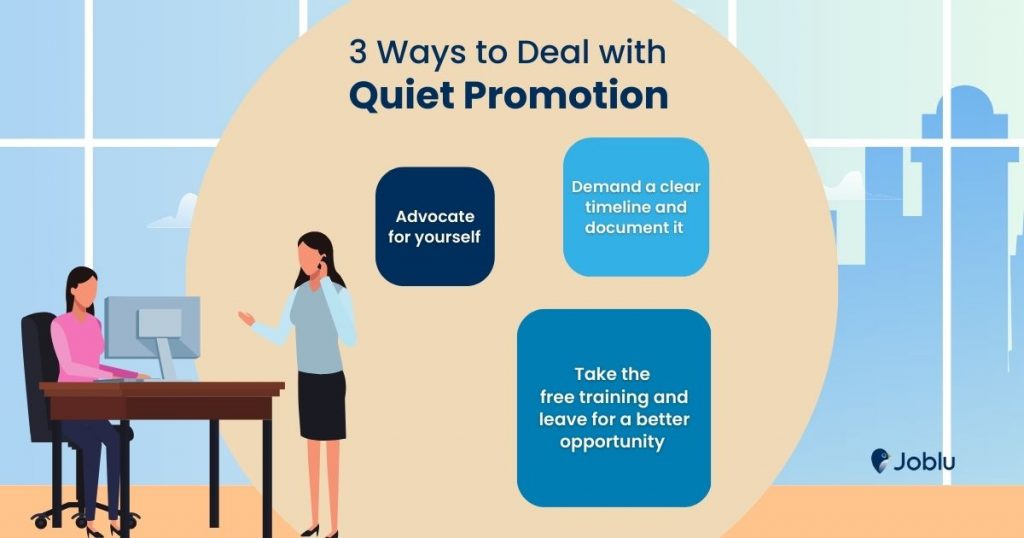Picture this: your company just had a mass layoff. Thankfully, you managed to hold on to your position. Then, one day, you receive an invite to a meeting that you normally don’t attend. Your manager tells you to come. You feel like you have no choice, so you attend. The meeting soon becomes a part of your daily routine, and with it, tasks and responsibilities befitting a team leader — which you’re not. You wait for an email congratulating you on your promotion, but alas, no promotion, not even a hint of it. Just more tasks and responsibilities piling up on your to-do list.
You’ve just gotten a quiet promotion.
Is it something to be happy about? Or it’s just another horror office series that will make you hate your job even more?
In this blog, we’ll take a comprehensive look at this phenomenon called quiet promotion. We’ll discuss the signs to look out for to know if you’ve been quiet promoted. We’ll also take a look at the effects of quiet promotion. Finally, we’ll give you pointers on how to deal in the workplace if you’ve been quiet promoted.
Table of Contents
What is quiet promotion?
The trendy coined phrase, like quiet quitting and quiet firing, has been making the rounds of social media. Quiet promotion, in a nutshell, is when an employee ends up doing more than what they signed up for in their original job description, without getting a change in their designation and pay. Like in our imagined scenario, it’s becoming more common because of the many massive layoffs happening all over the world in the last two years. According to the 2022 survey by employer-review site, JobSage, 78% of 1,000 full-time US workers have received extra duties without pay increase.
The phenomenon of quiet promotion isn’t new. However, the popularization of the phrase has opened up conversations about it. It’s now much more urgent as mass layoffs continue to happen not just in the US but all over the globe. The topic of healthy work-life balance also continues to dominate dialogues about workers’ rights. Many employees are sounding the alarm on quiet promotions as a top cause for poor work-life balance and overall job dissatisfaction.
Signs of Quiet Promotion

Not quite sure if you’ve been quiet promoted, or just “being a good team player”? According to the JobSage study, you know you’ve been quiet promoted if:
- Your manager/superior has asked you to take on tasks and responsibilities above your position
- You notice that you’re doing more than your colleague with the same job title
- You’re taking on the tasks of an absent co-worker, whether that co-worker has been laid-off or on extended leave
- You feel your company or team will take a blow if you don’t take on the extra responsibilities
- You feel exploited
A specific sign of quiet promotion is if you’ve suddenly taken on small managerial tasks without getting the manager designation. These tasks may include onboarding new team members, sitting in on meetings that only managers join, or coaching a team member for low performance.
Are you being quiet promoted if you’re agreeing to these tasks, anyway? Consider the fact that you’ve perhaps been manipulated into them. You’ve probably been gaslit into acting more like a team player. Perhaps you’ve also heard the sentence, “We’re trying to test your potential” as if you’re being prepared for a real promotion. This could be true, but if your department head or HR hasn’t actually brought up the topic of promotion, you can’t hold them to it.
If you’re still questioning if you’re being quiet promoted, look at how you’re spending your eight hours at work. If your additional tasks are taking up more than 30% of your daily timesheet, that means you’re taking on the work of two persons. If you have to extend your hours daily just to finish up your workload and all the additional responsibilities, there’s no denying it. That’s quiet promotion.
Effects of Quiet Promotion
Pros of Quiet Promotion
- Curse of the competent: Another phrase in league with quiet promotion is “curse of the competent”. For most, it can be a confidence boost, knowing that you’re so valuable to a team in the era of mass layoffs.
- Free training: Even without an actual promotion in sight, taking on more responsibilities gives you a preview of what’s to come when you climb up the ladder.
- Path to an actual promotion: If you look at the extra responsibilities as free training and try to do well, you might just land yourself a real promotion.
Cons of Quiet Promotion
- Health hazard: It’s no secret that poor work-life balance can lead to health problems. Not only can it affect your physical health; for some, feeling exploited in the workplace could lead to mental health issues.
- Taken for granted: Quiet promotions can be insidious in that you and your team can easily adjust to your setup. Once everyone has adjusted to your additional tasks, you could easily be taken for granted. Worse, you’ve allowed it to happen.
- It becomes part of your daily grind: Instead of being a temporary stop-gap solution, your quiet promotion could end up just being a part of your job description.
3 Ways to Deal With Quiet Promotion — and Make it an Actual Promotion

1. Advocate for yourself
2. Demand a timeline
3. Take advantage of the learning opportunity then leave
Saying no to opportunities, especially when they look like great learning experiences, can be challenging. Even more so when you feel like you have to step up to “take one for the team”. However, there’s a fine line between performing to your fullest potential and being exploited for your competence. Know your rights, demand respect from your employers, and fight for what you rightfully deserve.
Looking for a meaningful job opportunity with an employer that knows your worth? Download the Joblu app and gain access to excellent opportunities with companies from all over the world.
Frequently Asked Questions About Quiet Promotion
Q: What are the 3 types of promotion?
A: The 3 types of promotion are:
- Horizontal promotion – A horizontal promotion is akin to a pat on the back for a job well done. It entails a pay raise and an additional tag like “senior” to an employee’s current designation, without additional responsibilities. It’s an acknowledgment of that person’s tenure and contributions to the team.
- Vertical promotion – This is defined as “climbing up the ladder” — a new job designation, better pay, and more responsibilities befitting the leadership position. This is when a mid-level manager graduates to becoming a C-suite executive or director.
- Dry promotion – This is similar to a quiet promotion, only it’s in writing, so it’s official. It usually comes with a change in job designation, so it looks like an upward movement. The change in job designation often comes with new responsibilities, sometimes bigger ones. But the only difference with a vertical promotion is that it doesn’t come with a pay increase.
Q: How do you deal with your lack of promotion?
A: You can ask your manager for feedback on why you’re not getting promoted. Based on this feedback, you can draft a developmental plan with a clear timeline, in collaboration with your supervisor or manager. If your leaders continue to be vague about discussing your promotion with you, then perhaps it’s not about you. Reassess your career plan — perhaps it’s not yet time for you to get a promotion?
Q: How do you know you’re not being promoted?
A: If your leaders do not discuss the possibilities of your promotion during your feedback sessions, then perhaps they do not see you getting promoted.
Q: What are the 3 goals of promotion?
A: Employers promote employees with 3 goals in mind:
- To improve employee retention
- To acknowledge a specific employee’s hard work
- To encourage and inspire other employees to perform better
Q: Why do high performers fail to get promoted?
A: There are many different reasons why some high performers do not get promoted. One of the most common reasons is that they’re too focused on their job and do not need or want a promotion. Getting ahead in the workplace demands a certain willingness to play the gam, so to speak. Many high performers perform well because they find contentment in their current job. Therefore, they do not need external validation (i.e., promotion) as a reward. For them, doing the job well is the reward itself.